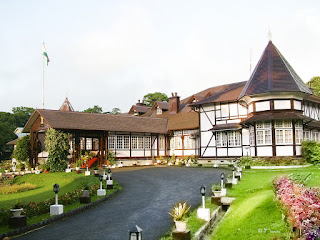Often pushed to the corner due to repeated terror strikes and under pressure to deliver 'peace', the Nawaz Sharif regime in Pakistan is reportedly keen to "change the narratives" about its relationship with India especially on problems in Jammu and Kashmir, claim Pakistani sources. Perhaps Mr Sharif wants to go down in history as a leader who delivered what he promised during 2013 general elections - that is an improved relation!
The Sharif regime's stint ends in 2018 and according to Pakistan Constitution elections are to be held within the 90 days after June 5, 2018.
According to observers of Indo-Pak relations especially from the Pakistani point of view, the Pakistan army chief Gen Qamar Javed Bajwa's unusual advice urging top officers read an American academic’s book on how India has succeeded in keeping the military out of politics - is a pointer.
"Our army general has urged top officials to read about Indian democracy. This is not without good reason," said a source.
This reference is significant as according to media reports, General Qamar Javed Bajwa urged the officers to read 'Army and Nation: The Military and Indian Democracy since Independence' written by Steven I Wilkinson. One vital take away from the book is that the Indian civilian establishment has successfully managed to keep its soldiers in the barracks. The army has to be an apolitical organisation and not the one dictating politics.
 |
| Gen Bajwa |
"We are waiting for the stalled talks to resume. But not to have formal talks is not the end of the world," a Pakistani source said here suggesting that Islamabad has Plan-B in place and would try to improve relations and especially ensure people-to-people relationship irrespective whether the formal parleys begin or not. In fact during 2013 election campaign, Mr Sharif had made a point to suggest that his government would be promoting trade and investment with India. This was not the first time that Sharif had gambled electorally trying to say that he would work to improve relations with India. He had made similar appeal even in 1997. Nawaz Sharif first became Finance Minister of Punjab province in 1981 and later the Chief Minister in 1985.
A former army corps commander who served in northeast India, once said, “Sharif surpassed Z A Bhutto’s popularity and in 1997 perhaps had emerged as Pakistan’s most popular Prime Minister since Muhammad Ali Jinnah".On a different plane, like most dynamics society, Pakistan too is at crossroads. It has many things of past, which it wants to avoid - may be. Pakistanis were part of the anti-communist bandwagon. In the words of columnist for Pakistani newspaper Dawn, Aasim Sajjad Akhtar, "The irony of history is that at least some of the same proxies that we (read Pakistan) cultivated to wage holy war against the Soviet Union metamorphosed into terrorists that we want to hunt down now".
While Pakistanis think it is debatable whether any substantive gains have been made in weakening the material and ideological infrastructure that sustains the terror elements - that is the right wing militancy, from the perspective of outsiders there is little to convince that Pakistan is sincere about curbing the right wing militancy.
None other than Afghan President Ashraf Ghani, who jointly inaugurated the annual Ministerial conference along with Prime Minister Narendra Modi at Heart of Asia at Amritsar, directly hit out at Pakistan for “launching an undeclared war” against his country and demanded an Asian or international regime to verify Pak-sponsor terror operations.
"We need aid to fight terrorism", said Ghani adding,
"We need to identify cross-border terrorism and a fund to combat terrorism.
Pakistan has pledged 500 million dollars for Afghanistan's development. This amount, Mr. Aziz, can be spent to contain extremism," Ghani said
directly addressing Pakistan's foreign policy chief advisor Sartaj Aziz, who also attended the conference.
According to some informed information from across the border, recently, Mr Sharif has also given indications that those personally close to him or those who have worked in his office (PMO) may be assigned India-related works. One serving official in Pakistan army has already gone on record to suggest that the new boss of Pakistan army does not have “visceral hatred” of India -- as probably used to the case in the past.
However, Indian strategic observers remain skeptical. They say Pakistan Prime Minister's gestures are to be taken "with a pinch of salt" as continued terror attacks in Jammu and Kashmir and Pakistani involvement in the valley unrest continue to create hurdles and raise questions about the "sincerity" of the Pakistani claims for peace with India.
It took Pakistan about 70 years to get here, at least making the right gestures! But the factors that were responsible for delay in this realisation have not disappeared, caution those in the know of things.
However, Indian strategic observers remain skeptical. They say Pakistan Prime Minister's gestures are to be taken "with a pinch of salt" as continued terror attacks in Jammu and Kashmir and Pakistani involvement in the valley unrest continue to create hurdles and raise questions about the "sincerity" of the Pakistani claims for peace with India.
It took Pakistan about 70 years to get here, at least making the right gestures! But the factors that were responsible for delay in this realisation have not disappeared, caution those in the know of things.





























